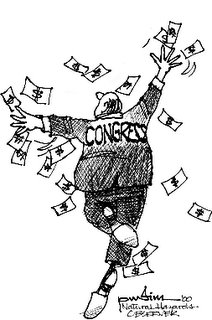Halting electronic gambling (further) subverts American political liberty

Today I happened to read an article describing how online betting is now under attack in Congress. [1] Essentially, congress wants to put in a bill that would prohibit credit cards and other payment forms of electronic payment for settling online wagers. Online wagering, according to Christiansen Capital Advisors, has been growing very quickly, and runs about $15 billion today, and will advance to almost $25 billion by 2010, or at least it would if trends are allowed to continue. [2] Half of the capital for online gambling comes from the US, which makes sense, because Americans have a good portion of extra income to waste. However, the actual gambling companies are located outside the US. I think this last fact is the most important one, though there are several reasons why I think this move by congress should be resisted.
First, it appears to me that congress is trying to halt what most members recognize cannot be regulated, and for bad reasons. The problem is, no doubt, we live in an era were responsible budgets are no longer generated by the two power-entrenched partys (Republican/Democrat). Internet gambling is being politicized in order to drain moneys from an industry that many consider "sinful."
There are several problems here, the but one I find most amusing, having been raised outside of Louisville, KY, is that horse- racing is the singular exception to this clamp-down. Internet betting on dog racing would be illegal. Internet gambling on camel racing would be illegal. But horses? Oh, that's just fine. This shows that congress is not interested in establishing and enforcing cultural mores best suited for society’s operation, but are arbitrarily placing laws to grab whatever easy money is available.
Second, in this case of limiting freedom of economic movement. there seem to be direct analogies to limiting the liberty of the citizens in other areas. This has been a growing trend by the US government, and it really should concern anyone who believes that the right to use one’s own fairly gained economic resources is a right worth protecting.
Again, since horse racing would be excepted, this maneuver is clearly *not* an example of congress protecting the moral or rational ineptitude of its citizens. Consider the following: there is no federal law for penalizing not wearing a motorcycle helmet, though that’s irrational to do (for risk assessment). There is no federal law outlawing cigarette smoking, though that’s irrational to do (for health reasons). Nor is there a federal law for outlawing pornography, imported B-movies, or velvet Elvis posters, though these are all examples of commercialized bad taste. There are things that are bad for some people; however, the tyranny of minority stupidity should never legislate over the liberty of majority freedoms. This is exactly what has happened in recent years, where every seeming whim of an power-expansive US government can be justified on the basis of safety or terrorism.
Again, this is were John Kindt, a business professor at the University of Illinois at Urbana-Champaign who has studied internet gambling, gets it wrong. He calls the Internet "the crack cocaine" of gambling, dramatically claiming that "There are no needle marks. There's no alcohol on the breath. You just click the mouse and lose your house," he said. This is also known as overstatement for dramatic effect. No doubt it was a nice text-bite for the journalist and for those scaring pious mothers of college students.
Finally, the philosopher John Locke (the main influence on Thomas Jefferson) wrote that under the law of nature, every man has “a power not only to preserve his property—that is, his life, liberty and estate, against the injuries and attempts of other men, but to judge of and punish the breaches of that law in others” [3]. Our life, our freedom of movement, and whatever land we own were all considered property in Locke’s view, and his writings spells out quite clearly the concept of natural property rights entitled to all persons. The idea of a constitutional government is to encode those natural rights into civil law. By accumulation of special interests and arbitrary tampering, the civil laws can subvert those rights, and the overall quality of life of the majority who live under that civil law. Here, we see congress attempting to arbitrarily take property --in the abstract "money" -- and thereby subverting liberty.
I can’t wait to tell my kids what it was like in the old days, when the US congress cared enough to guarantee the rights of individuals and the finances of the prosperous.
REFERENCES
[1] "Online wagering under attack in Congress" Yahoo News (Accessed July 11, 2006)
http://news.yahoo.com/s/ap/20060711/ap_on_go_co/internet_gambling
[2] "Internet Gambling Estimates" Christiansen Capital Advisors (Accessed July 11, 2006 )
http://www.cca-i.com/Primary%20Navigation/Online%20Data%20Store/internet_gambling_data.htm
[3] John Locke "The Second Treatise of Government, Chapter 7: Of Political or Civil Society 1690. Founder's Library (Accessed July 11, 2006)
http://www.founding.com/library/lbody.cfm?id=457&parent=447



2 Comments:
I agree with you here, but not because I see the actions as hipocritical, rather because I believe the federal government should be small, I guess like Republicans use to believe...
The book Are You Liberal? Conservative? Or Confused? ( http://www.amazon.com/gp/product/0942617541/sr=8-1/qid=1152643606/ref=sr_1_1/104-1381743-8928763?ie=UTF8 )
proposes an interesting alternative to both parties which he calls juris naturalist. A juris naturalist wants the least encroachment by government in all cases whereas liberals like encroachment financially and conservatives like encroachment socially.
Anyway, its a good, very short, read. Juris Naturalist is far closer to what the constitution architects saw as the ideal government than anything available today.
Juris Naturalist sounds a lot like the libertarian party, and since the libertarian party is already an official organization and very well organized, it seems like supporting them would be the reasonable course of action, given the beliefs of a juris naturalist sympathizer.
Post a Comment
<< Home